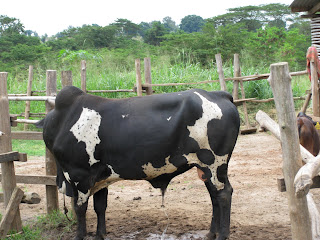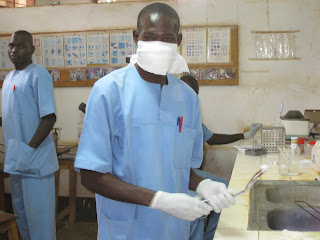

This center targets 35 students each year but this intake had three dropouts, one lady because of sickness one male due to family issues and the second male was a drug addict who could fight in the dormitory and was discontinued from the course which brought the number to 32.
An instructor who has been at the center for five years mentioned that vocational training is a good approach to development.
He mentioned that they use the East African syllabus during their and priority is given to the practical aspect (80%) and 20% to the theory.
He mentioned that he uses his stories and experiences to encourage and motivate his students to promote learning. He also invites those who have been trained at the center to come and share their experiences with the students which further encourages them to learn. He also tries to show them the opportunities available for them in the field after completion of their course which further motivates them to teach for example the many companies who come to look for builder all the time from the center. He further mentioned that the former students have been asking him about how they can improve their practices in terms of acquiring more skills.
He further mentioned that the curriculum they are using is lacking some aspects of advanced technology for example auto card and technical drawing which is relevant knowledge and skills to the builders.
He further elaborated that they do not limit anyone from joining the institution and can have students from those between primary six and and secondary six of the Ugandan syllabus.
He said that the primary leavers however give them a hard time to teach but this is solved by the adult literacy offered for the first six months for those students who take it seriously.
He also handles the language issue by expressing himself in both English and Arabic to promote better understanding and learning.
In an observation made at this workshop, the students were working in groups and as individuals and this to my mind is a good practice because they are able to learn from each other. The students also had protective wear in the form of overalls and gumboots to safeguard their clothes and their feet from cuts. This is a good gesture according to me because it ensures hygiene and encourages them to work and learn better.
The bricks are made by mixing water and the soft soil and this mixture is carried with their hands to a wooden mould and then displayed on a flat surface for drying.
In the case of a lot sunshine, the bricks are covered with dry grass to prevent them form cracking. When they dry up, they are piled in a square form in preparation of burning.
Another observation made in this department was that the instructor leaves the students with work and models to construct in his/ her absence. The students continue to work in their groups until they come up with something similar to the hand drawn sketch left with them. This according to me is a good practice because it promotes creativity and gives the students a self drive even in absence of a teacher. On the other hand, some of the students were not actively involved in the model and therefore close supervision can be an option to encourage them be creative and motivate them.













